Text
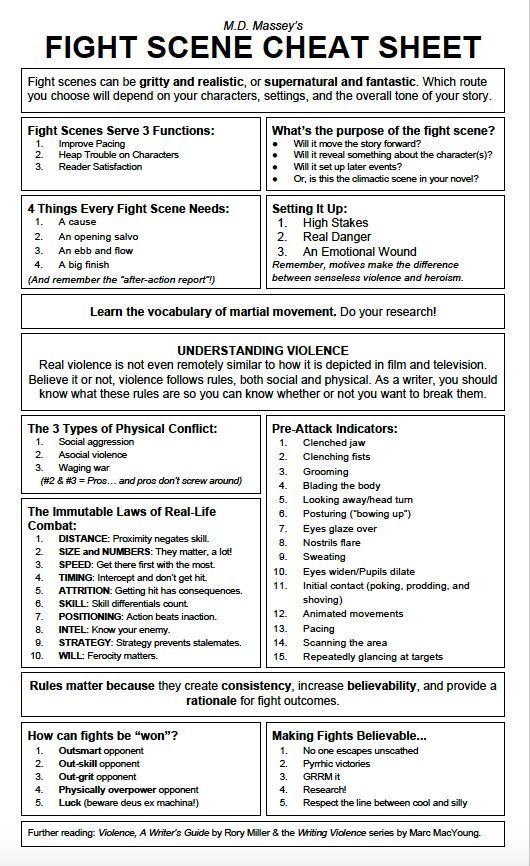
Writing tool for your fight scenes.
3K notes
·
View notes
Note
Is there any difference between a magician, sorcerer, wizard, and warlock/witch? And is the MC one of these things?
Yep, I think I answered this a long time ago, but here we go.
Magicians are humans with magical abilities, it is often used to denote all of the known types of magic users, as mentioned below.
Sorcerer/sorceress, like Zodiac, is a human born with innate magical capabilities. Until recently, there was no evidence of a metahuman sorcerer—not until the MC was born. They are able to cast spells and perform rituals using the magic reservoir running through their veins.
Warlocks are humans who acquired magical capabilities through pacts with otherworldly beings of great power, like ancient gods or interdimensional beings. They are obligated to follow the conditions of the pact, so most often than not, they are just puppets of their masters.
Wizards / witches are humans who, through great discipline and intelligence (and a little bit of innate potential), are able to teach themselves the art of magic. To cast spells, they are required to use a magical object to siphon the magic from, like spell-books, wands, cursed amulets, etc.
Thank you for the question!! 🥰
67 notes
·
View notes
Text
WIP Wednesday: The Act of Writing
Good Wednesday, Writerlings and Bookwyrms. We've been talking a bunch about what we write and what we think of what we write, so how about we instead talk a little bit about how we write.
So let's talk shop. Do you prefer to write on a PC or on your phone? Do you have any beverages available as you go? Do you prefer silence as you write, or do you have to have some music (or something else?) going while you work? Do you find that these habits vary over time, or is there one right way for you to do this?
20 notes
·
View notes
Text
WIP Wednesday: Supporting Characters
The rare WIP Wednesday: Thursday edition this week, bookwyrms and writerlings. Time is weird right now, what can I say?
Anyway, it's time to talk about the supporting characters of our stories. A good supporting character makes the world feel lived in, like there's a bunch of stuff going on and our heroes have to navigate a world full of people that got their own shit going on. A bad one makes the reader realize the author needed someone to mention that Rozenkrantz and Gildenstern are dead, or whatever, but that's not what we're focusing on today.
We're talking about the supporting characters that really work, who shows up enough and has a compelling enough presence to feel like they could be the protagonist in a different story. I want to know who your very favorite supporting character is. What makes them really stand out to you? Are they friend or foe to the protagonist, or perhaps some secret third thing? What's their stories look like, and what are they trying to achieve. Flex some extratextual information if you feel like!
#wip wednesday#on a thursday#writeblr#creative writing#share your secondary blorbos folks#let me see them
6 notes
·
View notes
Text
Troubleshooting Tuesday! (2)
(Hush, nobody knows today is Wednesday, this was posted on Tuesday AND NOT WEDNESDAY)
I'm here with questions and answers for you. Questions that might lead to solving plotholes, or just help you make your character 3D.
Today's troubleshooting for you!
Do you often notice that your characters are flatter than a ruler?
Sweetheart same, I tell you, I look back at some of the characters I've made and they are flatter than the emotions that Sleeping Beauty's prince had for her(you can't deny that he was in it for the girl and nothing else, have you HEARD Basile's version of this tale?!?). So here are some small things that might bring your character to life. Every small thing matters, it is these little titbits that settle into the subconscious of your reader and help breathe life into your character.
We are writers and I think we all universally agree that we notice everything. The small stain on your friend's trouser leg that no one except for you saw or how that small little bug on your balcony has a beautiful iridescent sheen to it. When you see these things in your real life why not implement them in your au as well ! It shouldn't feel like filler though, don't write things just for the sake of it. "She tucked the ends of her shirt in" or " He scooped some gravy with her spoon" not like this. But rather "She nibbled on her lips" and even "They cracked their knuckles". Habits and mannerisms are what make a human seem human, is what I like to think. So give them manners, like me, I'm a very fidgety person, I'm constantly either bouncing my leg or moving my hands or chewing or something, my ring, my locket, literally anything, cracking my bones etc. Here is another thing I do that I haven't seen many people doing, I have a cylindrical power and so I have to constantly wear glasses and have been wearing them for the last 5 years. I do this thing where I put my middle finger up to the outer corner of my eye and manually stretch or shape my eye lens, it's bad for me but it reduces eye strain when I am watching TV in low light. There are many other things that each of us do, we all have habits that make up some parts of our personality. it may be physical habits as stated above but they can also be mental habits(is that what it's called?) like overthinking every little thing, daydreaming or being lost in your thoughts analysing and overanalysing things, or even emotional things like feeling certain emotion for a certain type of person, or showing part of yourself to that particular type of person.
TLDR unless you WANT your characters to be as flat as your typical Karen, don't make them seem inhuman. Give them habits, mannerisms and more, make them humans(if they are that is).
1 note
·
View note
Text
Writing Prompt
"Sir, we've killed off the cavalrymen from Pandarna riding this way"
"Good, make sure that the ones who are dead stay dead"
"Roger sir"
(Listen this might not be the most original of prompts but it's been doing cartwheels in my head for the last 7 days)
9 notes
·
View notes
Text
WIP Wednesday: The Scene (Derogatory)
Howdy-ho, bookwyrms and writerlings. Today I've had kind of a busy day, so let's go for a bit of a variation of last week's theme for this one. Now that we've talked about scenes that we look forward to writing, how about the ones that we, well, don't? What about the scenes we dread like a dentist appointment or picking up the last remnant of your stuff from a shitty ex?
Maybe the scene is difficult, maybe it's uncomfortable, maybe it features a character you love being at their absolute worst, maybe it feels like a placeholder where you should write substance, or maybe it feels like too big of a deal for where it is in the plot.
So share away, fellow wordstronauts, let's hear what scene you're really not looking forward to writing.
9 notes
·
View notes
Text
I wanted to use one of my own short stories as an example in the re-blogs. It was quite a quick one that I wrote as part of a challenge, but I also tried to also write it as an experiment with this version of "show vs tell" in mind.
In this story, at the most basic level, I wanted to tell the audience about my protagonist’s fraught relationship with her emotionally neglectful mother.
A layer deeper, I want to tell them that my protagonist is a teenage girl and that the setting is a relatively modern magical world. I also want to throw in that she is a passionate illusionist, who has worked hard to develop her skills. Knowing all that, how could I do it without simply writing it out as I have just done?
I decided to start with the illusion being cast: a mouse on a kitchen table.
The mouse placed a front paw delicately on the chipped wood of the kitchen table. Its ears flicked forward. Whiskers flared around the twitching nose, soft grey fur shining in the milky winter sunlight that streamed through the half-shuttered window. Even the shadow it cast was perfect.
I'm going to take a handful of examples and describe what I was trying to do with each one:
chipped wood of the kitchen table — We are likely in someone’s home. Someone who is probably not very wealthy, given that their table is chipped.
Even the shadow it cast was perfect.—The shadow not being perfect is not something anyone should ever usually question. This should plant the idea in the audience’s mind that there is something unusual about this mouse; something that has necessitated the level of detail with which it is being described.
We now get this confirmed:
Carefully, the mouse lifted a second paw. As it did so, the grey fur blurred. Pink tail faded to a simple smudge of colour that vaguely glowed as Eira’s focus slipped. She bit her lip, trying to ignore the stiffness in her back from her hunched position. But as she tried to claw the image back, the mouse’s head flickered. For a moment, it froze in place, photographic detail changing to something more akin to a child’s cartoon, before the illusion dispersed completely.
She bit her lip, trying to ignore the stiffness in her back from her hunched position.—Eira is a hard worker, even tolerating physical discomfort to cast her spell as well as possible.
Eira let out a breath. Then her face split into a grin.
"It moved! Did you see that! Even the fur." She flicked her dark blonde hair over her shoulder as she stretched back in the chair. "You know, no-one else in class is even trying fur. They said if we wanted a challenge, we could go organic, but just something static, like an apple. It’s the light you see-"
Her dialogue now tells us that she is in school. The way she speaks hopefully informs the audience that she is older — likely a teenager. She’s proud of the hard work she has put in, and it is paying off!
They said if we wanted a challenge, we could go organic, but just something static, like an apple.—Eira is clearly a skilled illusionist as we know her teacher has recommended static illusions of non-organic objects, and we have just seen a lifelike mouse moving across her kitchen table.
And then we get to the response:
She cut off as she saw her mother. Her back was to the table, mug of tea in one hand and eyes passing over the colourful art magazine that lay in what little space was left between the piles of stacked dishes on the work-surface.
Eira’s smile faded.
"We’re you... We’re you even watching?"
The barest hum of acknowledgement answered her question. Paper crumpled as a page turned, and Eira swallowed.
"Mum?"
I’m telling the audience that Eira’s mother wasn’t watching, but what I’m hopefully showing is that her mother doesn’t really care about her daughter’s interests or achievements.
It goes on a bit more, where I try to give the suggestion that Eira’s mother’s lack of interest in her is partially due to her resentment of Eira’s father, but that’s the general gist of how I tried to use “show vs. tell” and this is already getting a bit long!
I hope that it is helpful!
Show vs Tell
or "Tell me something, without telling me something"
You may have seen people talking about showing vs. telling and how this can strengthen your writing. Originally attributed to Russian playwright Anton Chekhov with the quote, "Don't tell me the moon is shining; show me the glint of light on broken glass", the idea can cause a lot of confusion amongst writers. After all, isn't all writing telling?
A typical response to avoid 'telling' is to start 'showing' everything. Overly long descriptions of simple acts, such as opening a door, end up clogging up the page and slow pacing, and ultimately don't actually show much at all.
I've heard it said that one should typically 'tell' actions and 'show' emotions, but again I think this skirts around the real question, which is:
What do you actually want to tell the audience?
Trying to tackle "show vs tell" without first knowing what it is you want to tell, can leave you floundering in a sea of undirected clenched fists and smooth, cool doorhandles.
This is where TikTok comes in. And that's only half a joke!
You might have seen that TikTok trend, "tell me without telling me", which I think is a brilliant summary of what show vs. tell actually means; perhaps understandably, as the phrase was originally associated with visual media.
For those who haven't seen one of these videos, they tend to follow the format of someone talking to the camera, asking a tongue-in-cheek question such as: "tell me your boyfriend won't cheat on you without telling me your boyfriend won't cheat on you". It then cuts to someone else's clip of said boyfriend, excitedly describing his model figure collection or some other such thing.
What they tell us, in a light-hearted way is "I don't think my boyfriend would cheat on me because he's an adorable nerd, too involved in his own hobbies to be out searching for other partners behind my back", but what they show us is him being an adorable nerd. We are told through the showing, and this is exactly the same in writing.
Do you want to tell your audience that two characters have been best friends for years? Maybe you would show them having in-jokes and being visibly relaxed in each other's presence.
Do you want to tell us that your MC has a crippling fear of the dark? Maybe you'd show them being hesitant to go into that dark room where the lightbulb has blown even though all their friends are fine.
Do you want to demonstrate that your setting is the home of someone very wealthy? Perhaps you would then describe that beautifully carved, oaken door, polished to a bright shine with a golden handle. Or perhaps you would show us how their staff members act in their presence.
Whether it’s a relationship, an emotion, a setting, a skill-set; everything we show tells the audience something more. It's like a lens focusing in on an important detail, so we only want to use it for things that are really important for the audience to know.
In summary, focus on figuring out the key things you want to tell your audience first, then play the game — how can you say those things, without ever saying them at all?
Thanks for reading, and I’d love if you want to re-blog this with some of your own examples! I’m going to do one of my own.
Wren
13 notes
·
View notes
Text
Show vs Tell
or "Tell me something, without telling me something"
You may have seen people talking about showing vs. telling and how this can strengthen your writing. Originally attributed to Russian playwright Anton Chekhov with the quote, "Don't tell me the moon is shining; show me the glint of light on broken glass", the idea can cause a lot of confusion amongst writers. After all, isn't all writing telling?
A typical response to avoid 'telling' is to start 'showing' everything. Overly long descriptions of simple acts, such as opening a door, end up clogging up the page and slow pacing, and ultimately don't actually show much at all.
I've heard it said that one should typically 'tell' actions and 'show' emotions, but again I think this skirts around the real question, which is:
What do you actually want to tell the audience?
Trying to tackle "show vs tell" without first knowing what it is you want to tell, can leave you floundering in a sea of undirected clenched fists and smooth, cool doorhandles.
This is where TikTok comes in. And that's only half a joke!
You might have seen that TikTok trend, "tell me without telling me", which I think is a brilliant summary of what show vs. tell actually means; perhaps understandably, as the phrase was originally associated with visual media.
For those who haven't seen one of these videos, they tend to follow the format of someone talking to the camera, asking a tongue-in-cheek question such as: "tell me your boyfriend won't cheat on you without telling me your boyfriend won't cheat on you". It then cuts to someone else's clip of said boyfriend, excitedly describing his model figure collection or some other such thing.
What they tell us, in a light-hearted way is "I don't think my boyfriend would cheat on me because he's an adorable nerd, too involved in his own hobbies to be out searching for other partners behind my back", but what they show us is him being an adorable nerd. We are told through the showing, and this is exactly the same in writing.
Do you want to tell your audience that two characters have been best friends for years? Maybe you would show them having in-jokes and being visibly relaxed in each other's presence.
Do you want to tell us that your MC has a crippling fear of the dark? Maybe you'd show them being hesitant to go into that dark room where the lightbulb has blown even though all their friends are fine.
Do you want to demonstrate that your setting is the home of someone very wealthy? Perhaps you would then describe that beautifully carved, oaken door, polished to a bright shine with a golden handle. Or perhaps you would show us how their staff members act in their presence.
Whether it’s a relationship, an emotion, a setting, a skill-set; everything we show tells the audience something more. It's like a lens focusing in on an important detail, so we only want to use it for things that are really important for the audience to know.
In summary, focus on figuring out the key things you want to tell your audience first, then play the game — how can you say those things, without ever saying them at all?
Thanks for reading, and I’d love if you want to re-blog this with some of your own examples! I’m going to do one of my own.
Wren
13 notes
·
View notes
Text
WIP Wednesday: The Scene
Merry WIP Wednesday Bookwyrms and Writerlings. Today, I want to talk about The Scene. The big one, the one thing your whole being aches to write, the one you have a playlist dedicated to, the one you have an animatic set to your favorite song all blocked out and ready to shoot in your head already, the one scene that your writing leads up to, the thesis of the entire project crystalized in a single segment of storytelling.
If you have such a scene, like I have, why have you not written it yet? Is it deep into a franchise of books you've only just started on? Does it require more aptness with a genre or style of writing than you feel you have at the moment? Is it perhaps more comfortable in the flexible, responsive, ever-expansive world of thought than the messy and tragically linear world of fiction on the page? Or is it as simple as it belongs near the end of a book you haven't written yet and you prefer to write things out linearly?
Hell, if you've actually taken a crack at writing the thing out, how did that work out for you? Was it everything you've dreamt it to be or do you keep trying to catch the morning dew soul of that one perfect scene in the clumsy net of writing?
Sound off in the rbs, I'm excited to hear what y'all's white whales are.
-peebs-
10 notes
·
View notes
Text
Troubleshooting Tuesday!
I'm here with questions and answers for you. Questions that might lead to solving plotholes, or just help you make your character 3D.
Today's troubleshooting for you!
Do you get confused about whether your WIP should have multiple POVs, or just one first-person view maybe you should go on a completely different path and do the third person??
Here is a little something that might help you. (Spoiler for Silent Patient)
Decide whether you want the readers to feel your characters' emotions. One of the main reasons why authors choose the first person is that they want readers to feel the emotions that the character is feeling. Eg Cruel Prince
But then some say it might become monotonous and boring so you go with multiple pov's, this includes first person pov's of many different characters. But then again if there are pros there are cons too. Multiple POVs mean that it might get crowded and difficult to understand, as you might have heard, books have finite pages and unless you want a book that looks like your English dictionary you're gonna have to sacrifice the amount of time the reader gets to have with your characters. Eg Six of Crows
Or if you wanna risk it all and go with the well-walked path of third-person POV then that has its advantages too. First and foremost and it might just be my opinion, most of the time it rules out the possibility of an unreliable narrator. Books like Silent Patient are the best example to explain what I mean. You get a broader perspective on what exactly is happening in a scene, for example, your characters are in a shopping mall - in first person you usually have a specific thing your character is focusing on and unless they are Sherlock Holmes or Byomkesh Bakshi it would be quite uncanny writing about the clerk cleaning the shelves and the workers gossiping about their latest boss, and might unnecessarily lengthen your book without giving it any real content, whereas in TPP you can easily slide this in.
On the other hand, there are some problems you may face, which make it difficult for readers to understand what is actually going on in a character's head, or what their opinions are on certain topics. Of course, these aren't the only problems and not the only pros, but they give an insight into the facts.
Now I know I may not be the first person to cover this topic, in fact, I don't even think I come in the top 100 people but as someone who struggles quite a bit becuase of this, I tried to make it as comprehensive and compact as I could. It might not look so, but trust me I've seen so many of these and they are NOT short, I tried to condense it as much as I could and added in some points that I think others might relate to and find help from. Let me know if is missed something and if I should add more to it, writers know the best for writers and no one else. (I of course didn't add the elephant that is "second person" even I am scared and confused as to what the hell it even means so if someone knows kindly help a youngster out)
Lastly, @1indigoisles , apology accepted and arse laughed off. Although whatever is said is absolutely true, from "what Troubleshooting Tuesday means" to "this grp is my baby" you're paying child support and there is nothing you can do about it.
6 notes
·
View notes
Text
Okay, I'm gonna be honest here. I have never, ever posted on this group-blog before, and no I am not ashamed to admit it (I am slightly ashamed).
I am doing this now because my friend, @jeahreading, is mad at me for not posting on here, or something like that, I don't really remember (I remember it as though it were a few seconds ago). Also I shut down an idea for the blog that she had, and it was during one of my condescending controlling bitch moments so, it really was her fault for not catching on (don't come at me, Jeah, this whole thing is an apology post basically). And this is just a 2000s Disney movie with a grand "I'm Sorry" gesture at the end, except it's 2024, we're on Tumblr and there's no romance, sorry guys (we actually had a whole ass convo about it).
Anyway, I do have some substantial info to provide - I am not delusional enough to think that only the above will do - so I am going to introduce Jeah's idea.
Although I have no idea what it's about, but I'll be trying to guess, it's called Troubleshooting Tuesday, where I think you talk about the most problematic parts of your WIP, i.e., plot-holes, the next scene you're trying to write, the deep stuff that is just so hard to articulate (like grief and so on), etc. It could also be a complicated character with a difficult backstory and buckets of trauma. Maybe a tension between your soulmates and you're trying not to make it too high that it'll break their bond entirely, or not too little that it'll be uninteresting. Or maybe you're looking for synonyms for 'said', the root of all our problems.
Again, this is for the benefit of Jeah, who says that this blog is her 'baby', and she wants to 'see it flourish'. I don't know about all that, but she's trying to be a young mother over here and I'm in support.
#writing#writeblr#writers on tumblr#writer stuff#bookblr#creative writing#writers#writing community#troubleshooting tuesday
5 notes
·
View notes
Text
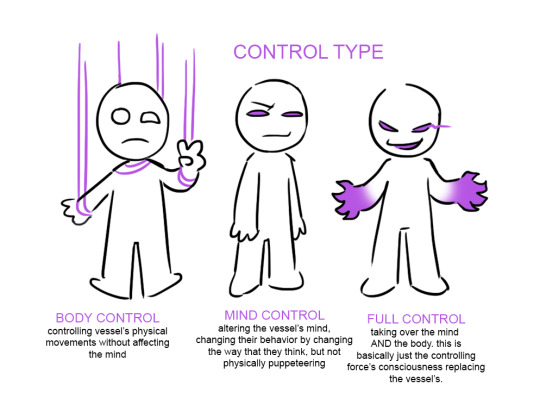
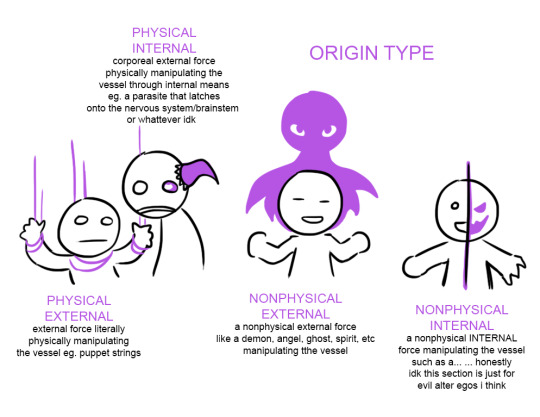
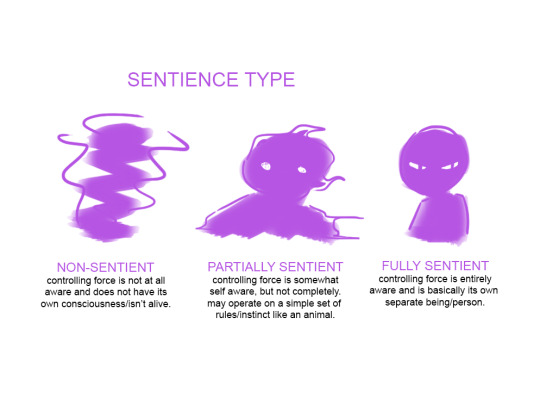
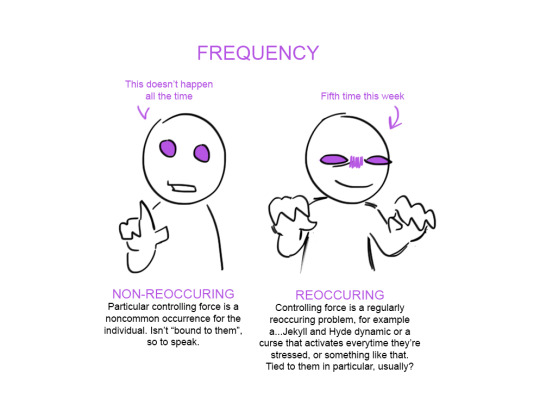
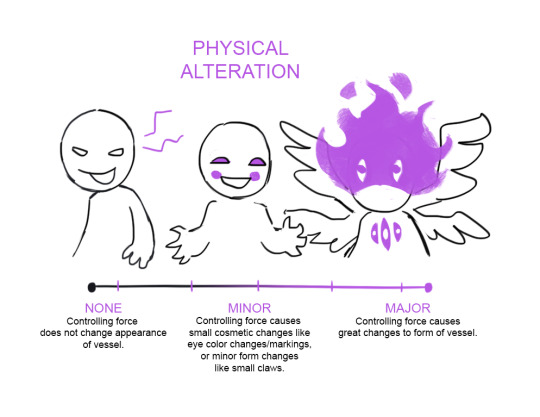
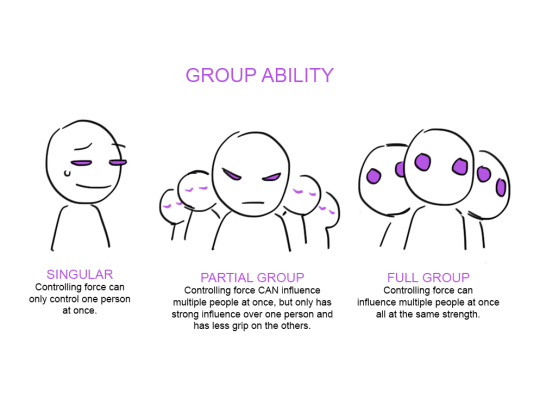
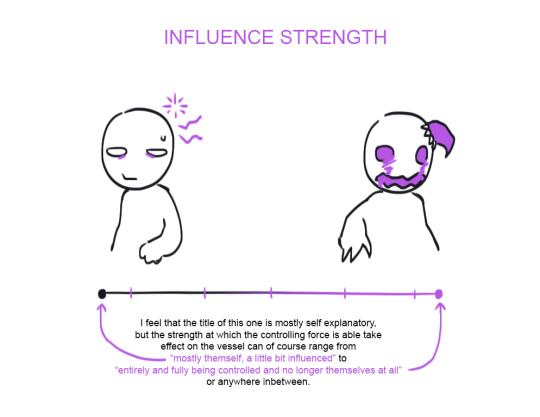
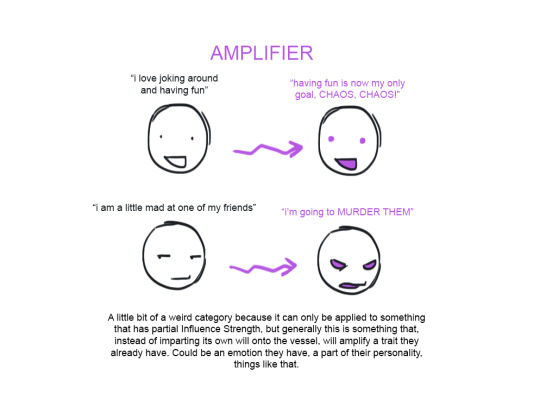
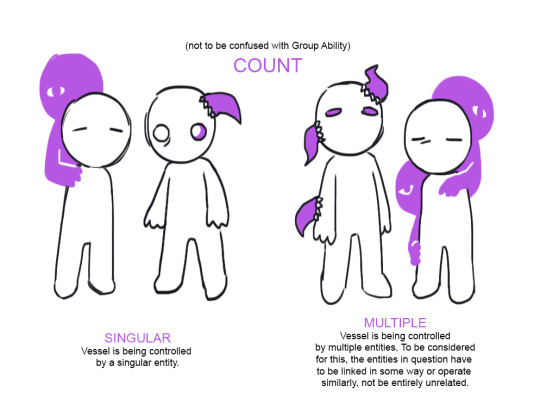
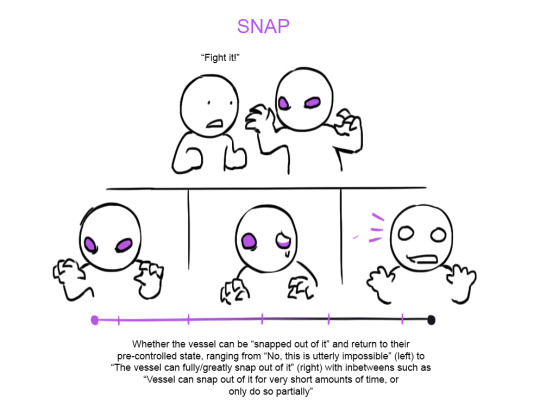
Hello i'm a normal person here's some stuff i drew to illustrate different traits different "person getting controlled" tropes can have
50K notes
·
View notes
Text
WIP Wednesday: Worldbuilding Dominos
Good WiP Wednesday, Writerlings and Bookwyrms. We've been talking shop about stuff outside your stories for a while, so let's change tracks for this week. Today, I want to hear the wackiest cause-effect links in your worldbuilding. Is there, to quote a semifamous post here on tumblr, a secret order of alligator-keeping battle nuns in your setting to keep the vampires out of the sewers, and now the vampires have managed to popularize heavy veils and broad-brimmed hats to facilitate easy and safe movement in the city, so now the vampires are all fashion icons and have to watch out for paparazzo rather than sunlight, leading to an unusual alliance between the church and the media.
Your examples, of course, don't have to be quite so elaborate, but one thing does tend to tie into another, so don't be afraid to stretch those connections a bit. Can't wait to see what y'all have come up with.
Sound off in the RBs
-Peebs-
7 notes
·
View notes
Text
Writing Prompt
"She never accepts that she has commited the murder, rather seldom offers minute gestures signifying her involvement in the heinous crime(s), albeit it only leads to a judgement in the court of hearts, for the artificial courts have never given anything other than injustice."
This serves as a little taeser for a WIP me and @jeahreading are currently working on.
4 notes
·
View notes
Text
Magic System Memorandum
20 Questions to learn about your magic system!

Fantasy writers! Do you have a magic system? Would you like to tell everyone about it?
@teacupsandstarlight and I have compiled a list of questions on magic systems! Originally this was an excuse to ramble about our respective magic systems, whilst also creating a handy compendium at the ready for future reference, but we thought why not open it up to let other people ramble about their magic systems too? :D
Below are 20 questions, designed to take a deep dive into your magic system:
20 Questions:
We’ve all heard about hard and soft magic systems, but these do not exist as a binary. On the Mohs hardness scale, from diamond to talc, how hard is your magic system?
Is the magic in your fantasy world related to the natural environment, or is it a separate entity, inert and unconnected to nature?
Has the geography of your world been affected by magic? If so, how?
Is magic limited to humans, or is it accessible to all creatures in your world?
Is the source of magic in your world internal, i.e. the magic itself comes from within your character, or is the source external and exists outside of them?
For characters who can use magic, is this a learnt skill or an ability they are born with? Is it a bit of both? Can magical ability be bestowed on a character by someone or something else?
If magic is a skill only accessible to those born with magical ability, is there a genetic link?
Does magic in your world require tools to use?
What are the costs of using magic in your magic system?
Are there any limitations to what magic can do? If so, what are they?
Do you have multiple types of magic in your system? Are any types rarer than others?
Does magic affect a user’s status in society?
Is there any inherent morality in your magic system? Is some magic considered immoral, and if so, is this purely cultural? Is there forbidden magic in your world?
How has your magic system shaped the history of your world?
How has magic affected the technologies developed in your world?
Are there any magical festivals or rites of passage?
Do workplaces require the use of magic in your universe? What kind of jobs do your magic users do?
What is the most mundane use of magic in your story?
What is the most extreme use of magic in your story?
What is your favourite application of magic in your story?
We’ve tried to make the questions follow a logical thread, but you are under no obligation to follow our order when answering, or even to answer all of them! Please do adapt these questions to your universe’s needs. Expand as much as you like! Think outside our boxes!
Feel free to use these as an ask game, or tag anyone whose magic system you would love to learn more about!
81 notes
·
View notes
Text
If your plot feels flat, STUDY it! Your story might be lacking...
Stakes - What would happen if the protagonist failed? Would it really be such a bad thing if it happened?
Thematic relevance - Do the events of the story speak to a greater emotional or moral message? Is the conflict resolved in a way that befits the theme?
Urgency - How much time does the protagonist have to complete their goal? Are there multiple factors complicating the situation?
Drive - What motivates the protagonist? Are they an active player in the story, or are they repeatedly getting pushed around by external forces? Could you swap them out for a different character with no impact on the plot? On the flip side, do the other characters have sensible motivations of their own?
Yield - Is there foreshadowing? Do the protagonist's choices have unforeseen consequences down the road? Do they use knowledge or clues from the beginning, to help them in the end? Do they learn things about the other characters that weren't immediately obvious?
84K notes
·
View notes